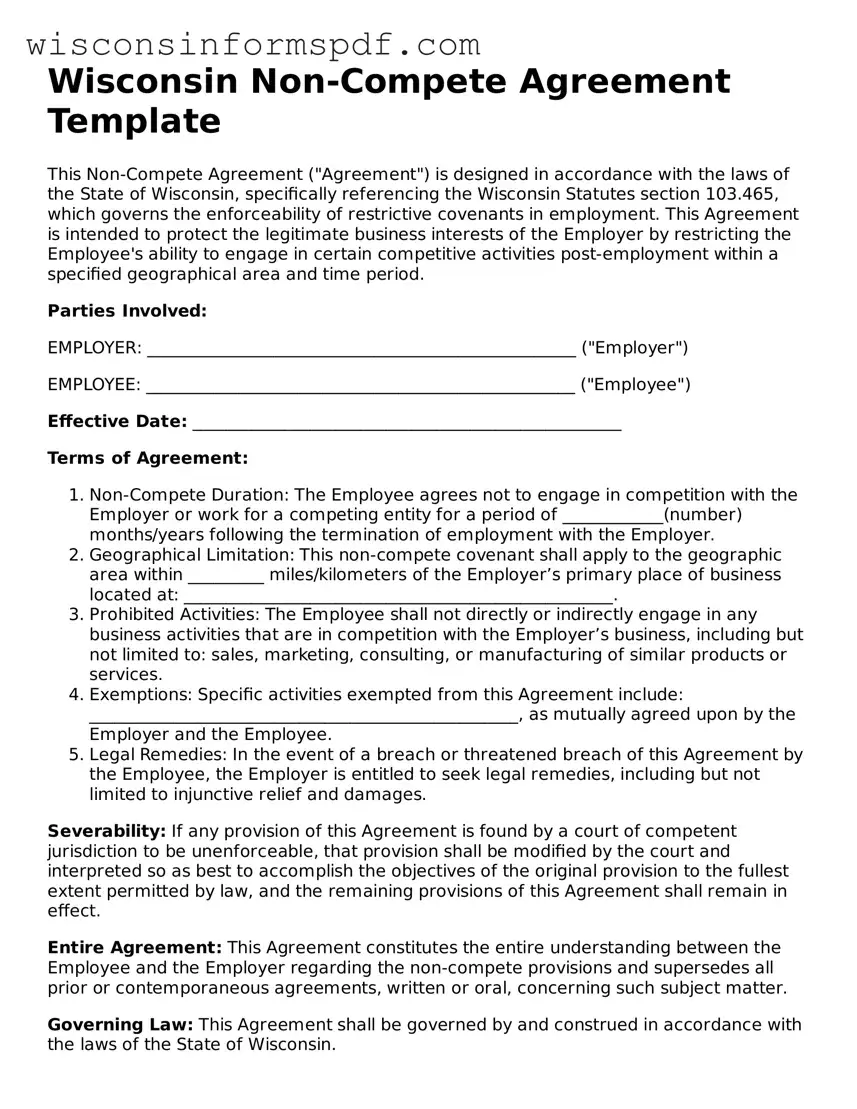What is a Non-compete Agreement in Wisconsin?
A Non-compete Agreement in Wisconsin is a legal document that prevents employees from working in competitive positions or starting a competing business within a certain timeframe and geographical area after leaving their current employer. Its purpose is to protect the employer's business interests, trade secrets, and confidential information.
Are Non-compete Agreements enforceable in Wisconsin?
Yes, Non-compete Agreements are enforceable in Wisconsin, but they must meet specific requirements. The agreement must be reasonable in terms of duration, geographical area, and the type of employment or line of business restricted. Moreover, it must be necessary to protect a legitimate business interest of the employer.
What makes a Non-compete Agreement reasonable in Wisconsin?
For a Non-compete Agreement to be seen as reasonable in Wisconsin, it should not impose any greater restriction on the employee than is necessary to protect the employer's business interests. The duration of the restriction typically should not exceed a couple of years, and the geographic limitation should reflect the area where the employer actually does business. Additionally, the scope of activities restricted should be closely related to the employee's role and the company's industry.
Can a Non-compete Agreement be enforced if an employee is terminated without cause?
In Wisconsin, the enforceability of a Non-compete Agreement does not depend directly on whether an employee is terminated with or without cause. However, courts may consider the circumstances of the termination when assessing the reasonableness and enforceability of the agreement. An agreement may be deemed unenforceable if it appears to impose undue hardship on an employee who was terminated without just cause.
What happens if a Non-compete Agreement is deemed too broad or unreasonable?
If a court finds that a Non-compete Agreement is excessively broad or unreasonable, it has the discretion to modify the agreement to make it enforceable. This could involve reducing the duration of the restrictions, narrowing the geographical area, or limiting the scope of activities restricted. Alternatively, the court may choose to invalidate the entire agreement if it finds that doing so is necessary to prevent undue hardship on the employee or if the agreement is fundamentally unfair.
Can an employee negotiate the terms of a Non-compete Agreement?
Employees are entitled to negotiate the terms of a Non-compete Agreement before signing. It's advisable for employees to review the agreement carefully, consider its implications on their future career opportunities, and seek legal advice if necessary. Negotiations may result in modifications to the duration, geographical scope, and other key aspects of the agreement to make it more favorable or fair to the employee.
Does the employer have to provide additional compensation for the Non-compete Agreement?
In Wisconsin, there's no statutory requirement for employers to provide additional compensation or benefits specifically for entering into a Non-compete Agreement. However, offering additional consideration, such as a signing bonus, salary increase, promotion, or other benefits, can strengthen the enforceability of the agreement and provide incentive for the employee to agree to the restrictive covenants.
Are there any professions exempt from Non-compete Agreements in Wisconsin?
Wisconsin law does not specifically exempt any professions from Non-compete Agreements. However, courts may scrutinize agreements involving professions that impact public health and welfare, such as doctors, with greater caution. The reasonableness of the restrictions, including their impact on the availability of services to the public, will be a significant factor in determining enforcement.
How can an employer enforce a Non-compete Agreement?
To enforce a Non-compete Agreement, the employer must typically file a lawsuit against the former employee who is believed to be in breach of the agreement. The employer will need to prove that the agreement is reasonable and necessary to protect their legitimate business interests and that the employee's actions are in violation of the agreement. If successful, the employer may obtain an injunction to prevent further breaches and possibly recover damages for losses incurred as a result of the breach.

